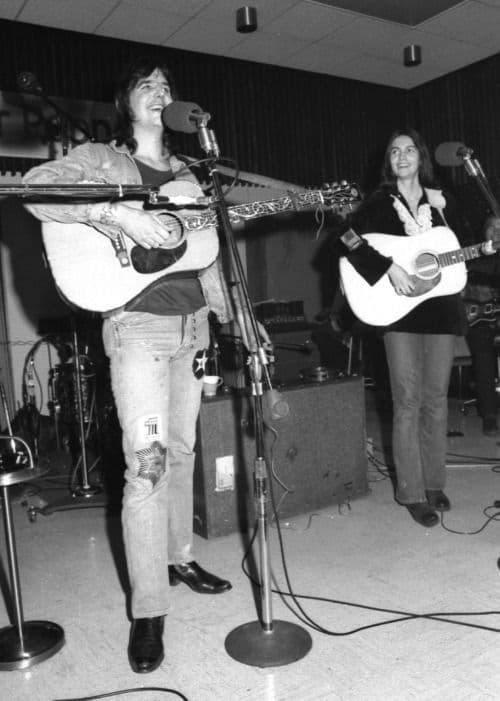
The enduring pain of a love that was never meant to be.
The air hung heavy with a sense of both profound beauty and deep, impending sorrow. It was the summer of 1973, and Gram Parsons and a young, relatively unknown Emmylou Harris were in the studio, a whirlwind of creative energy and shared musical vision. What they created would become a touchstone of country and folk music, a haunting testament to a connection that was both undeniable and tragically fleeting. Their rendition of “Love Hurts”, a song written by Boudleaux Bryant and originally recorded by The Everly Brothers in 1960, was more than just a cover; it was a conversation between two kindred spirits.
This wasn’t a song that was ever meant to be a commercial blockbuster for them. Their version, released posthumously in 1974 on the album Grievous Angel, didn’t chart as a single. In fact, it was the raw, hard-rocking take by the Scottish band Nazareth a year later that would find international chart success, a testament to the song’s versatility but a jarring contrast to the gentle ache that Parsons and Harris imbued it with. For them, “Love Hurts” wasn’t about a broken heart in the arena-rock sense; it was a fragile, intimate confession of the pain that comes with a love that can never be fully realized.
The story behind this recording is steeped in a melancholic poignancy that is difficult to ignore. Parsons, a pioneer of “Cosmic American Music” and a troubled genius battling addiction, had found in Harris a musical soulmate. Their harmonies were effortless, their voices blending into a single, aching lament. It was a perfect storm of talent, emotion, and tragedy. Harris herself would later say that singing with Parsons helped her find her own voice, and their duet on “Love Hurts” became a pinnacle of their brief but potent partnership. This wasn’t a professional arrangement; it was two people pouring their souls into a microphone, their closeness evident in every subtle vocal nuance. The pain wasn’t a metaphor; it was real, tied to Parsons’s personal demons and their unspoken, platonic, yet deeply emotional bond.
The album Grievous Angel itself is a work of immense gravity, released just four months after Parsons’s death from a drug overdose. The entire record is infused with a sense of foreboding, a final, beautiful statement from a man who knew his time was short. In this context, “Love Hurts” takes on an even heavier weight. It’s a mournful farewell, a shared lament for all the pain that came before and all the pain that was yet to come. It’s the sound of two people, standing on the edge of a great chasm, acknowledging that the pain of love is a price they are willing to pay, even if it ultimately leads to heartbreak. For those of us who grew up with this music, hearing this song today is like opening a time capsule. It’s a reminder of a bygone era, of vinyl records on a Sunday afternoon, and of the raw, unpolished emotion that defined a generation of music. The song is not just about a breakup; it’s about the inherent vulnerability of love itself, the risk we all take when we allow ourselves to truly connect with another human being. It’s the sound of a beautiful dream turning into a sad reality, and it resonates with a quiet, powerful grace that no other version of the song has ever been able to capture.